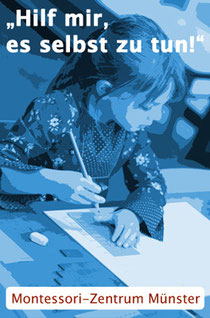Learning Today Needs to Stimulate Intrinsic Motivation
Lecturers in teaching methods agree that, within the framework of educational and learning processes, an intrinsic motivation has to be stimulated, which means that young people study because they are interested in a certain subject-matter. However, it is also undisputed that today it seems to be more difficult than ever to stimulate an intrinsically motivated learning didactically.
By means of free work this central problem of learning at school is solved outstandingly, as recent studies have repeatedly proved. With obvious pleasure and staying power the children work on the tasks that they have chosen themselves. Moreover, as regards the psychology of learning and motivation it is particularly important that the degree of difficulty of tasks is in accordance with the children’s abilities, which is made a lot easier by the structure of free work. In this respect, it is significant that Montessori’s didactic material is structured according to her principle of the analysis of complex learning processes; it usually consists of different elements so that learning is organised step-by-step. Furthermore, the pupils’ motivation is encouraged by the immediate echo as to their success by means of the mistake control that is part of a lot of materials.
Particularly ominous for the pupils’ motivation, especially that of the less gifted, is the usual form of evaluating the children’s work by means of a rough scheme of marks that is orientated towards comparing the pupils among themselves. In Montessori free work, the necessary orientation towards achievement is realised less by means of social comparative processes — although they play a role, too — but more by the matter itself and the individual progress in learning. The mistake control that is connected to the material makes it possible for the pupil to evaluate his abilities immediately and is structurally in accordance with an evaluation that is orientated towards learning goals. In addition, the pupil’s attention is primarily drawn to his own progress in learning as all the fellow pupils work with different materials and choose a different main emphasis of their activities on account of their different interests and abilities.

 Kompetenz in Montessori-Pädagogik
Kompetenz in Montessori-Pädagogik
